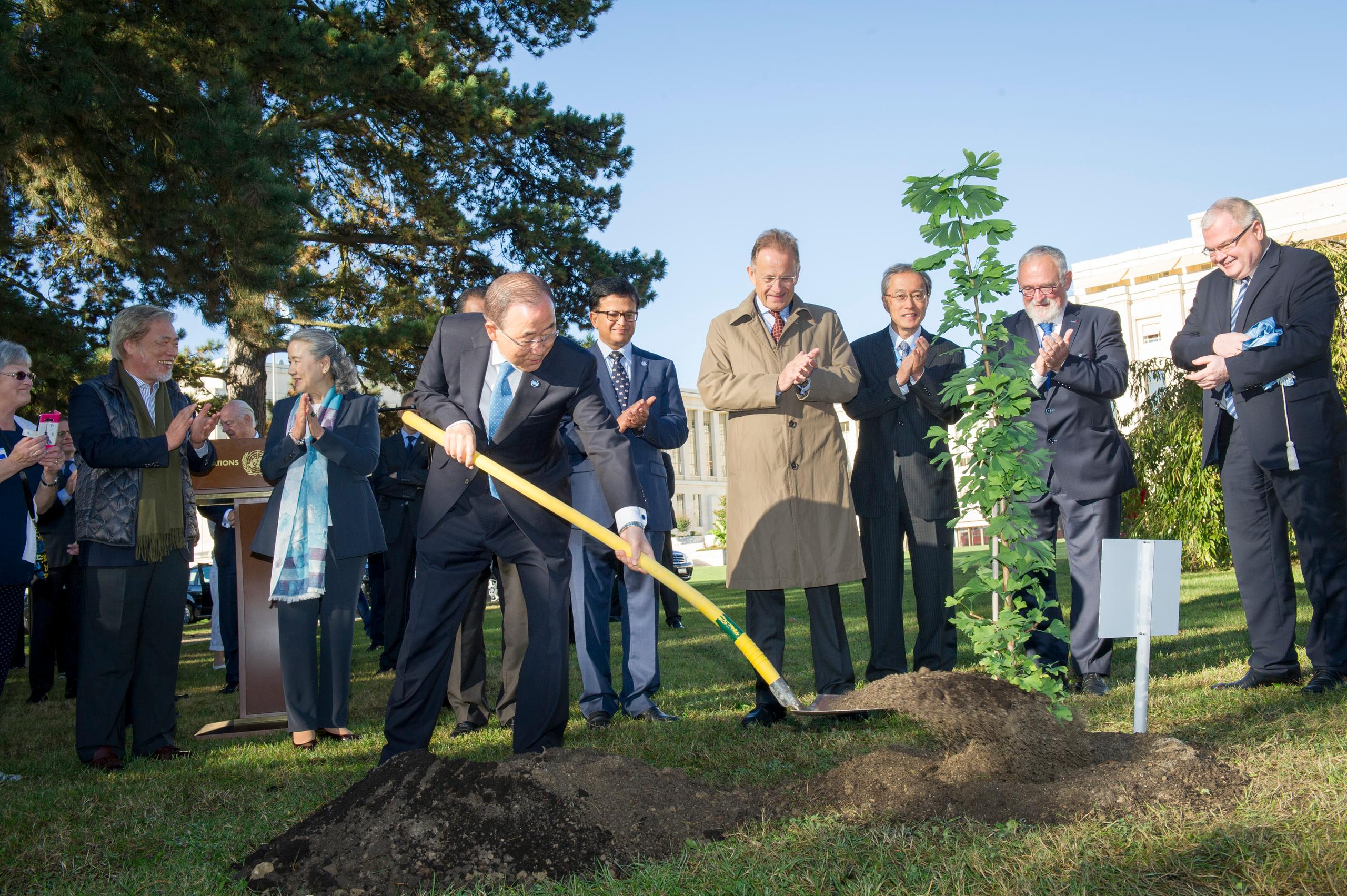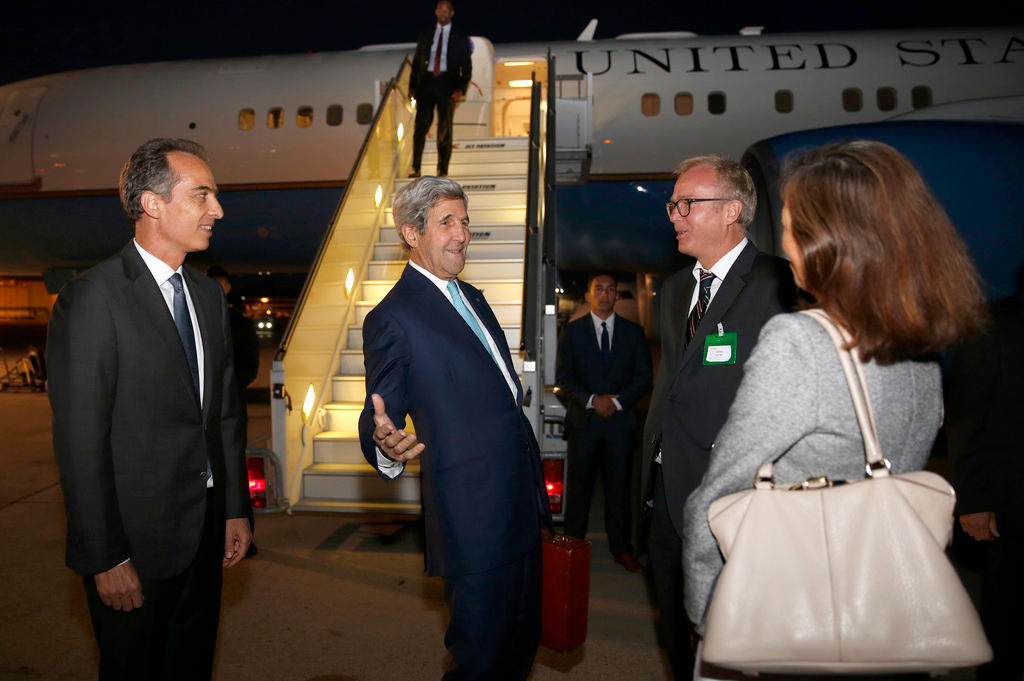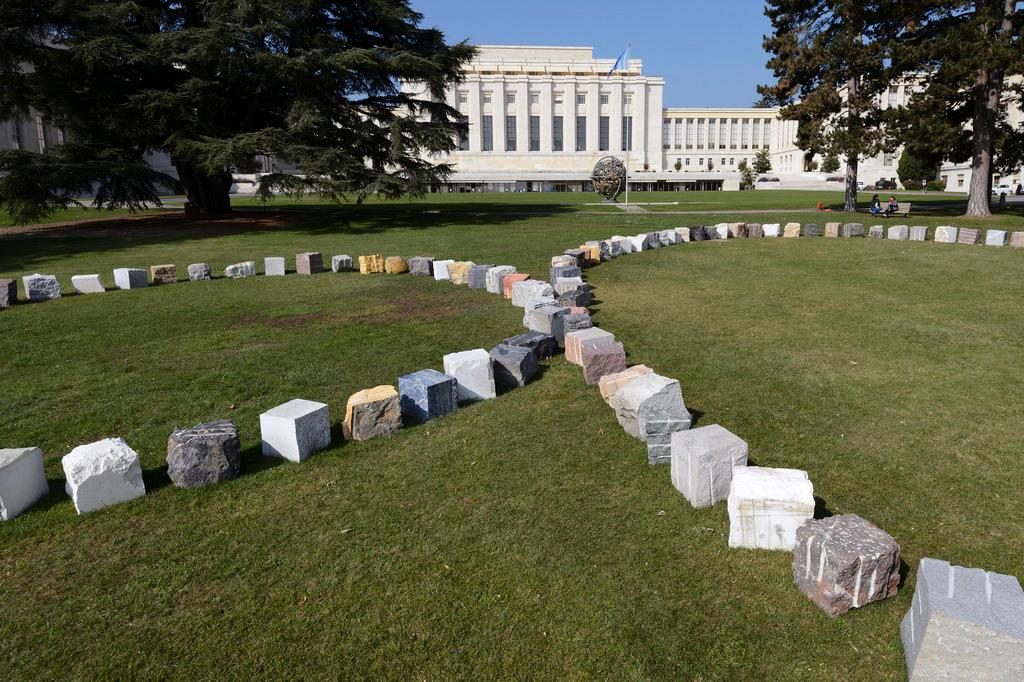UN chief thanks Swiss for Palais des Nations support

During his final farewell tour to Switzerland, the outgoing United Nations Secretary-General Ban Ki-moon has thanked the Swiss authorities for their “very generous” financial support towards modernising the historic Palais des Nations complex.
“I’ve made over 40 visits to Switzerland as secretary-general. This Palais des Nations is my second home,” Ban, whose ten-year tenure ends in December, told reporters at the UN in Geneva on Monday.
“I thank Switzerland for generously supporting our Strategic Heritage Plan which secures these premises for future generations.”
Over the next eight years, the UN’s European headquarters, built in the 1930s, is set to be renovated at a cost of CHF836.5 million ($846.6 million) – half financed by interest-free loans from the Swiss government and canton Geneva.
On Tuesday, the secretary-general travelled to the Swiss capital Bern for a breakfast meeting with Economics Minister Johann Schneider-Ammann, who holds the rotating presidency this year, and the presidents of the two chambers of parliament.
Schneider-Amman thanked Ban for ‘ten years of dedicated service’ at the helm of the UN and stressed Swiss commitment to the global body and aim to further consolidate International Geneva’s position as a centre of global governance.
Le président de la Confédération offre une petite visite de Berne à #BanKiMoonExternal link https://t.co/KhB1YXMXNTExternal link #PresidentCHExternal link pic.twitter.com/xPElRQPZUWExternal link
— RTSinfo (@RTSinfo) October 4, 2016External link
“Fires still burning”
At Monday’s press conference in Geneva, Ban touched on some of the “fires still burning” during his time as secretary-general, such as Yemen and Syria, where “words cannot express our outrage over the carnage and brutality”.
“We hoped for a different result,” the 72-year-old UN chief declared, referring to Sunday’s shock referendum result in Colombia after 50.2% of voters rejected a peace deal with leftist rebels.
The UN welcomes the maintenance of a ceasefire in Colombia despite the vote and said its special envoy, Jean Arnault, would also travel to Cuba to help the process.
“I count on them to press ahead until they have achieved lasting peace,” said Ban.
He took time to praise the 2030 Sustainable Development Goals process and Paris climate deal, which “shows that leaders can tackle sensitive topic together”. Entry into force could be possible within one month, he added.
In Geneva he also attended the opening of the UN refugee agency’s executive committee and met officials from the World Economic Forum (WEF), the International Committee of the Red Cross (ICRC), and the city and canton of Geneva.
Unhappy Geneva staff
Ban also addressed UN staff, many unhappy with current working conditions. During their meeting, Prisca Chaoui, deputy executive secretary of the UNOG Staff Coordinating Council,External link the staff union, painted a black picture.
“As you leave the UN, you leave behind civil servants who are full of concern and apprehension about their future,” she told Ban.
The union representative said staff feared job cuts after the introduction of an expensive software designed to unite UN employees scattered around the globe and another efficiency initiative aimed at streamlining administrative services.
She said staff were also unhappy with aspects of the renovation plans at the Palais des Nations aimed at turning it into a modern operational UN hub. In particular, they criticise the use of open space and possible “hot-desking”: ten staff for eight desks.
“This is supposed to be his big farewell tour and he wants it to be positive PR, but he needs to be accountable,” the staff union’s executive secretary Ian Richards told swissinfo.ch. “It’s hard to find staff who will miss him. Not like his predecessor Kofi Annan.”
Sapling for a nuclear-free world
Earlier in the day, Ban planted a gingko biloba sapling in the UN’s Ariana Park. The 1.5-metre sapling comes from a tree that survived the Hiroshima atomic bomb on August 6, 1945.
“This beautiful sapling is a symbol of resilience and of peace,” said the secretary-general, while reiterating a call for a world free of nuclear weapons.
He said divergent views existed on how to reach this goal, but he reminded states of their responsibility to pursue nuclear disarmament as an urgent priority.
The Geneva-based Conference on Disarmament, a now largely moribund UN-sponsored forum, has been blocked with little progress for over 20 years, with the nuclear states boycotting multilateral talks on nuclear disarmament.
Finger on the button
On Monday morning Ban carried out another symbolic act: turning on the Jet d’Eau fountain on Lake Geneva.
#UNSGExternal link Ban Ki-Moon turns on #GenevaExternal link jet d'eau fountain pic.twitter.com/6Xqz9G5ecEExternal link
— Simon Bradley (@sibradley1) October 3, 2016External link
On Tuesday the secretary-general travels to the Swiss capital Bern for a breakfast meeting with Economics Minister Johann Schneider-Ammann, who holds the rotating presidency this year, and the presidents of the two chambers of parliament.

In compliance with the JTI standards
More: SWI swissinfo.ch certified by the Journalism Trust Initiative












You can find an overview of ongoing debates with our journalists here . Please join us!
If you want to start a conversation about a topic raised in this article or want to report factual errors, email us at english@swissinfo.ch.